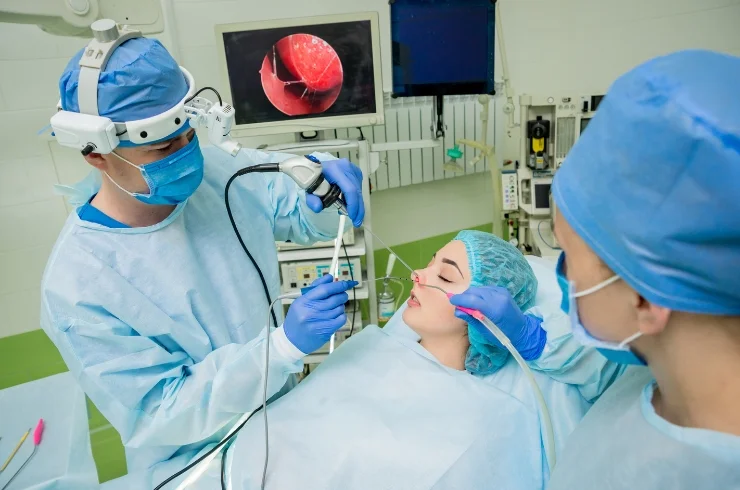Full House Endoscopic Sinus Surgery

Full House Endoscopic Sinus Surgery (FESS) is a minimally invasive surgical procedure used to treat chronic sinus conditions, particularly when conservative treatments such as medications or nasal sprays fail. This advanced technique is designed to clear the nasal passages and sinuses, improving airflow and drainage. FESS uses endoscopes, which are small, flexible tubes equipped with cameras and light sources, allowing surgeons to visualize and treat the sinuses with precision, while minimizing the need for large incisions.
Indications for Full House Endoscopic Sinus Surgery
FESS is typically recommended for patients with:
- Chronic Sinusitis: Persistent inflammation of the sinus linings that lasts for 12 weeks or longer.
- Recurrent Acute Sinusitis: Frequent episodes of severe sinus infections.
- Nasal Polyps: Noncancerous growths in the nasal passages or sinuses that obstruct airflow and cause chronic congestion.
- Deviated Nasal Septum: When a misalignment of the nasal septum contributes to sinus obstruction.
- Sinus Tumors: Benign or malignant growths that may affect sinus function.
- Fungal Sinus Infections: Infections caused by fungi, often in patients with compromised immune systems.
Procedure Overview
Anesthesia: The patient is typically given general anesthesia or local anesthesia with sedation to ensure comfort throughout the surgery.
Endoscopic Visualization: A small endoscope (a flexible tube with a camera and light) is inserted through the nostrils to provide a clear view of the sinus cavities. The endoscope allows the surgeon to directly visualize the sinus passages on a monitor, enabling accurate diagnosis and treatment.
Sinus Opening: The surgeon uses specialized instruments to open and clear blocked sinuses, remove polyps, and take out any infected tissue. In some cases, a Full House technique may involve surgery on all major sinus cavities to fully restore proper sinus function.
Cleaning and Draining: The surgeon clears out mucus, infected material, and any other obstructions, ensuring proper sinus drainage and improved airflow.
Closing: Since FESS is minimally invasive, it does not require external incisions. The natural openings of the sinuses are used, reducing scarring and promoting quicker healing.
Advantages of Full House Endoscopic Sinus Surgery
- Minimally Invasive: FESS is performed through the nostrils, eliminating the need for large external incisions, which results in less trauma and a faster recovery.
- Improved Visualization: The endoscope provides clear, real-time images of the sinus cavities, allowing for more precise surgery.
- Preservation of Healthy Tissue: FESS removes only the infected or obstructed tissue, preserving healthy structures within the sinus and nasal passages.
- Faster Recovery: Patients typically experience less pain, swelling, and bleeding compared to traditional sinus surgery, leading to a quicker recovery time.
- Better Outcomes for Chronic Sinus Issues: FESS significantly improves symptoms of chronic sinusitis, including congestion, facial pain, and sinus pressure.
Postoperative Care and Recovery
- Pain Management: Most patients experience mild discomfort after surgery, which can be managed with over-the-counter pain medications or prescribed analgesics.
- Nasal Care: The use of nasal saline sprays or irrigation is often recommended to keep the sinuses moist and promote healing. Patients may also be instructed to use nasal decongestants or steroid sprays to reduce swelling.
- Activity Restrictions: Patients are usually advised to avoid heavy lifting, strenuous activities, or blowing the nose for a period following surgery to ensure proper healing.
- Follow-up Appointments: Regular follow-up visits with the surgeon are important to monitor healing, remove any residual mucus or scabs, and ensure the sinuses remain clear.
Risks and Complications
While Full House Endoscopic Sinus Surgery is generally safe, like any surgical procedure, there are risks involved:
- Infection: Although rare, there is a risk of infection at the surgical site.
- Bleeding: Some bleeding during the surgery or postoperatively is common, but it is usually minimal and controlled.
- Damage to Surrounding Structures: Although rare, there is a slight risk of injury to structures near the sinuses, such as the eyes, teeth, or brain.
- Recurrence of Sinus Issues: In some cases, sinus problems may return, and additional treatments may be needed.
